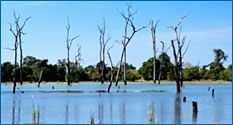The first India Water Forum 2011 was inaugurated by- his Excellency Shri M Hamid Ansari, the Hon’ble Vice President of India in the auspicious presence of distinguished guests Dr Farooq Abdullah, Hon’ble Minister for the Ministry of New and Renewable Energy and Mr. Salman Khurshid, Hon’ble Minister, Ministry of Water Resources, Dr R K Pachauri, Director General, TERI and Col. Rakesh Johri, Senior Fellow Water Resources Division, TERI.
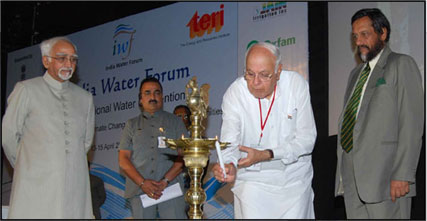
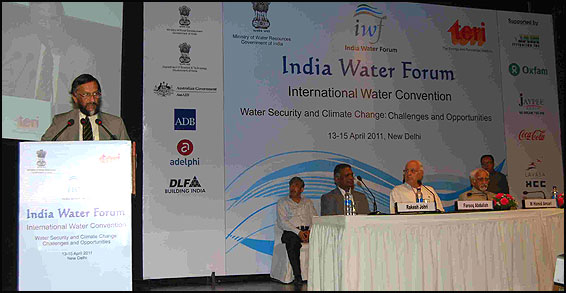
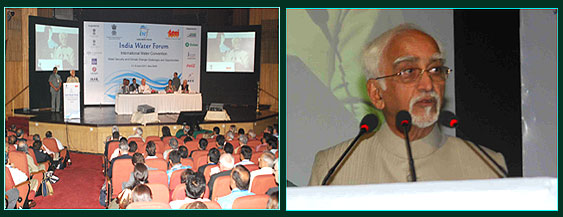
The India Water forum 2011 addressed the dynamics of water and climate change, and deliberated on significant issues specific to water security, means to resolve the same by investment in natural infrastructure, monitoring efficient usage, water treatment and leveraging eco-friendly technology for water usage that will help in ensuring sustainable development. But, more importantly it emphasized on the fact that water security is not a subject for the future it is here with us today.
 Session I: Challenges and opportunities for global water security
Session I: Challenges and opportunities for global water security
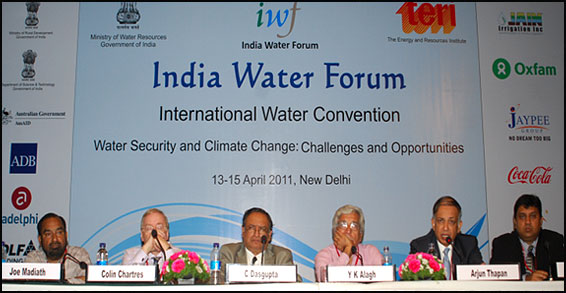
The session catered to all the dimensions of water security with Global as well as the Community based perspectives in the era of climate change. The challenges faced in the present scenario for Global water security are because of Exponential Population growth, Rapid Urbanization and Industrialization. The session addressed some of the specific issues of water security and to resolve the same by investment in natural infrastructure, monitoring efficient usage, water treatment and leveraging technology for water usage etc. Speakers of this session include: Mr C Dasgupta (Chairperson), Dr Y K Alagh, Dr Colin Chartres, Mr Arjun Thapan, Dr Joe Madiath and Mr Ganesh Pangare
 Session-II: Water vulnerabilities, resilience and adaptation
Session-II: Water vulnerabilities, resilience and adaptation
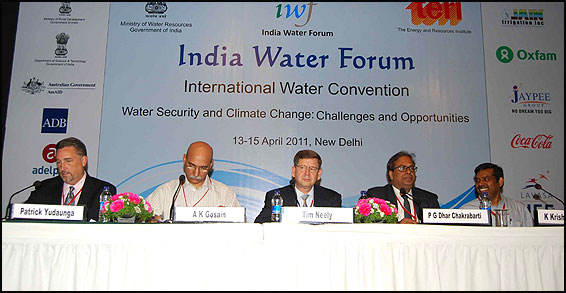
The discussion in the session revolved around water vulnerability as reflected in changing patterns in nature, such as climate change, changing trend of natural disasters, rainfall and temperature distribution, in context of the Indian sub-continent. The attempts being made to develop resilience to these changes and the challenges faced in process of planning adaptation were discussed. One common opinion throughout the session was that India’s agricultural sector, the largest consumer of water, relies heavily on monsoon for its supply. Since the speakers were from diverse backgrounds, many aspects of the issues related were covered ranging from hydrological modeling, agriculture and food supply to water conservation in business and industry and the planned city of Lavasa. Speakers of this session include: Session II (a)- Dr A K Gosain (Chairperson), Dr Tim Neely, Mr P G Dhar Chakrabarti, Mr Patrick Yudaunga, Dr K Krishna Kumar, and in Session II (b)- Dr Arabinda Mishra (Chairperson), Dr Eddy Moors, Dr Mats Eriksson, and Mr Krunal Negandhi.
 Session III: Regional water security, resource use and allocation
Session III: Regional water security, resource use and allocation
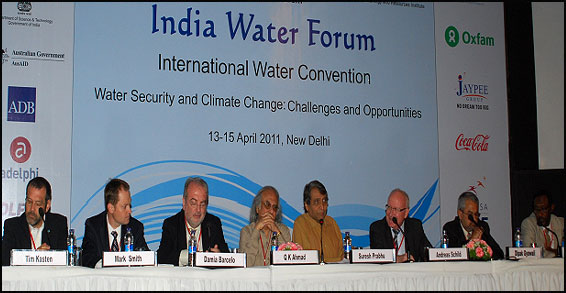
The session focused on the challenges faced in Water Resource Use and Allocation, and measures that would allow assurance of water security. The resolution to all the challenges where not only discussed with a global view but with a regional perspective also. Almost all the speakers proposed the importance of ecosystem driven techniques to ensure water security. The session also touched upon expanding the costs and benefits, finding multiple ways to bring together stakeholders so that co-operation works at local, regional and thus global level. Speakers of this session include: Mr Suresh Prabhu (Chairperson), Dr Andreas Schild, Mr Q K Ahmad, Dr Dipak Gyawali, Prof. Damia Barcelo, Dr Abdin Mohd Ali Salih, Mr Tim Kasten, and Mr Mark Smith.
 Session IV: Climate change impact on natural water systems
Session IV: Climate change impact on natural water systems
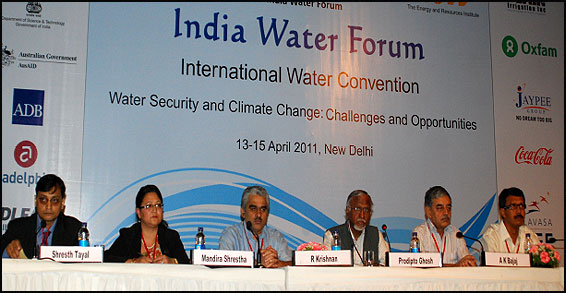
The discussion addressed issues relating to impact of climate change on natural water systems such as melting glaciers, changing monsoon pattern, water related natural disasters like Glacial Lake Outburst Flood (GLOF) etc. Some speakers detailed the modeling approach to these issues by way of simulation modeling of river basins across the country. Flood risk reduction and flood analysis were also discussed. Speakers of this session include: Dr Prodipto Ghosh (Chairperson), Mr A K Bajaj, Prof. R Krishnan, Prof. Chandan Mahanta, Dr Mandira Shrestha, Dr Prateek Sharma, and Dr Shresth Tayal.
 Sessions V: Water quality and health
Sessions V: Water quality and health
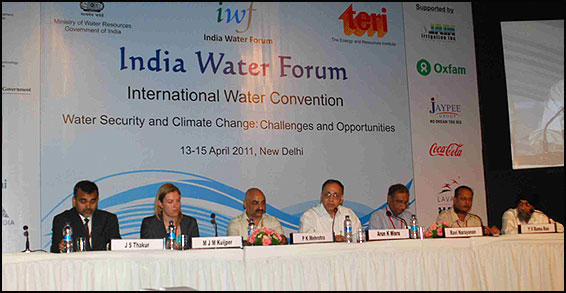
The discussion revolved around challenges, concerns to improve water quality (both surface and ground water), water borne diseases affecting human health and productivity, linkages of climate change and human health and global approaches to tackle the geo-genic and anthropogenic contamination of water resources. Speakers of this session include: Mr. Arun Kumar Misra (Chairperson), Mr. Ravi Narayanan, Dr. P K Mehrotra, Mr. J S. Kamyotra, Dr. J S Thakur, Dr. M.J.M. Kuijper, and Dr. Y.V. Rama Rao
 Session VI: Rural water supply and sanitation
Session VI: Rural water supply and sanitation
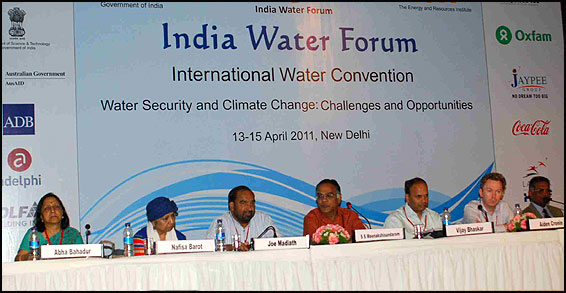
The session focussed on equitable access and decentralized system for water distribution and sanitation. The chairperson opened the session by addressing the need to concentrate on finding solutions rather than highlighting the problem and replicating the success stories. The speakers shared their experiences and approaches to the problems faced in rural areas in water supply and sanitation. They explained the need for creating awareness and involving people, and emphasized the need of proper access to sanitation facilities, particularly for women. Speakers of this session include: Dr S S Meenakshisundaram (Chairperson), Mr Vijay Bhaskar, Dr Joe Madiath, Dr Aidan Cronin, Dr Nafisa Barot, Mr Rakesh Johri, Ms Abha Bahadur and Mr Vikas Chawla.
 Session VII: Water and food security
Session VII: Water and food security
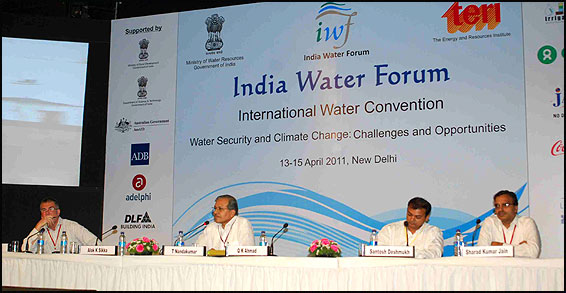
The session addressed three key issues namely 1)The known impacts of climate change, 2) Enhancing crop Productivity in climate change 3) How current food policies should address the climate change and food security. Speakers of this session include: Mr T Nandakumar (Chairperson), Mr Q K Ahmad, Dr Santosh Deshmukh, Prof. Sharad Kumar Jain and Prof. Paul McShane.
 Session VIII: Sustainable cities, water supply and distribution
Session VIII: Sustainable cities, water supply and distribution
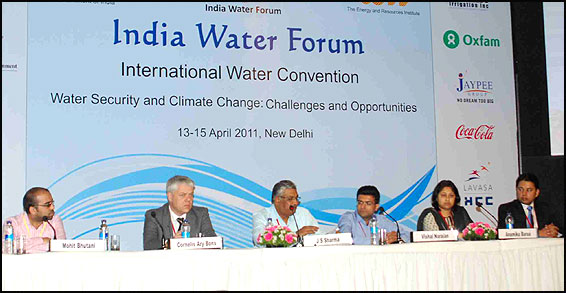
The session essentially concentrated on water availability, security and quality concerns in various cities. The impact of these issues on the population was discussed and solutions to be implemented at administrative, managerial and engineering levels were offered. The speakers offered insight into some of the best practices for delivery of clean water. The importance of accepting and adapting to the changing scenarios and natural systems was also highlighted in a discussion about coping with these changes and was elaborated upon in detail. Speakers of this session include: Mr Navin Kumar (Chairperson), Dr Anamika Barua, Dr Cornelis Ary Bons, Mr Mohit Bhutani, Dr Vishal Narain, Mr Anshuman and Dr Madhusuda Chaudhari.
 Session IX: Science and technology challenges for water
Session IX: Science and technology challenges for water
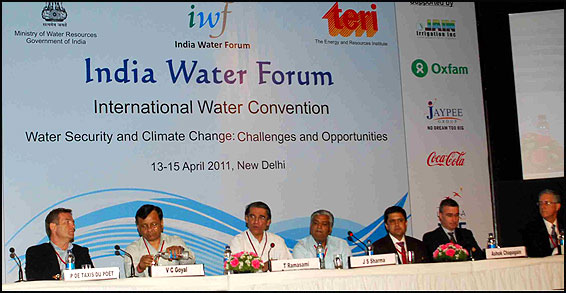
The session dealt with importance of science and technology in improving water use efficiency. The session contained latest technological developments in tackling water contamination and improving efficiency. Speakers of this session include: Dr T Ramasami (Chairperson), Dr J R Sharma, Dr V C Goyal, Dr Ashok Chapagain, Dr Philippe DE TAXIS DU POËT, Mr Fergal Whyte and Dr Jon MacDonagh Dumler.
 Session X: Policy governance and regulatory framework
Session X: Policy governance and regulatory framework
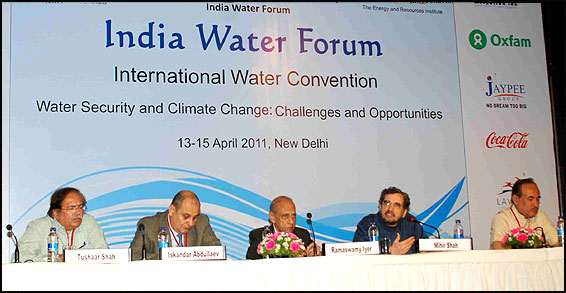
The discussion revolved around understanding the policy implications of climate change and identifying measures for innovative, adaptive governance that reduces vulnerability and increases capacity. It also emphasized on significance of mechanisms like climate centric development, mainstreaming climate change into institutional reforms and strategic development activities. Speakers of this session include: Prof. Ramaswamy Iyer (Chairperson), Dr Mihir Shah, Mr Ajit Nimbalkar, Dr Iskandar Abdullaev, Dr Tushaar Shah and Dr Manish Kumar.

